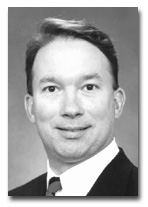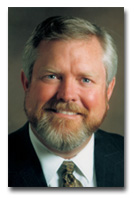W
hen the American Textile Manufacturers Institute (ATMI) holds its 54th annual meeting,
April 3-5, in Coral Gables, Fla., it will be a much different organization than in the past. Once
recognized as the US textile industry’s central trade association and its voice in Washington, the
ATMI of today is one of at least four organizations involved in lobbying for the textile industry
in the capital. In its heyday, ATMI had a staff of 35 and 19 committees dealing with a wide range
of issues affecting the industry, including communications, consumer affairs, cotton and wool,
environmental preservation, safety and health, human resources, home furnishings, economic
information, and international trade and market development. Hundreds of industry executives served
on various committees and subcommittees.
However, deteriorating business conditions, bankruptcies of some of its largest members and
defections for other reasons have resulted in a sharp decline in ATMI’s revenues and in major staff
reductions. Over the past two years, the staff has been reduced to 11. ATMI currently has 13
committees, including four new ones created to address issues related to specific product
categories – apparel fabrics, home furnishings, industrial fabrics, and yarn and thread. This past
year, ATMI announced plans to create a bed and bath division to deal with issues such as
flammability, copyright protection and country-of-origin issues, and to provide economic
information and analyses specifically related to bed and bath products.
Historically, ATMI’s greatest strength has been its committees and the active involvement of
its member companies and individual executives. That strength continues today, although with fewer
people from the industry and a smaller staff. One significant change at the annual meeting is that
Carlos Moore will be leaving after 22 years of service as international trade director and
executive vice president.
Parks D. Shackelford, a former congressional committee staffer and US Department of
Agriculture official, took over as president and chief staff officer in July 2002. Shackelford sees
ATMI as an organization “in transition,” brought about as a result of the contraction of the
domestic industry and major changes that will result when import quotas are removed by January
2005. “We are in a period of change, and how we react to that change and how successful we are in
shaping that change is crucial to the future of our industry,” Shackelford told
Textile World
. He says ATMI’s overall mission is to continue providing the industry with a wide range of
services, with particular emphasis on influencing government regulatory issues and international
trade policies.

The Biltmore Hotel in Coral Gables, Fla., will host the 54th annual ATMI meeting, April
3-5.
A Voice In Washington
While ATMI traditionally has been the textile industry’s voice in Washington, where
international trade is concerned, it now shares that responsibility with a number of other
organizations. However, ATMI is the only organization with a full-time staff based in Washington.
In most cases, the other organizations represented in Washington have the same general
international trade goals as ATMI, but in the past, and to some degree today, they also have some
policy differences. An indication of these differences was seen in the final House vote granting
Trade Promotion Authority (TPA) to the president last year, when 18 House members from what are
considered solid textile districts voted for it and 18 opposed it.
While there were extenuating circumstances in some cases, the votes do reflect some policy
differences within the various organizations lobbying on textile issues. One relatively new
organization working the halls of Congress and the administration, as well as the grass roots, is
the American Textile Trade Action Coalition (ATTAC), a consortium of some three dozen textile
companies and the labor union UNITE, formed in April 2002 with the leadership of Roger Milliken,
CEO and chairman, Milliken & Company, and Bruce Raynor, UNITE president. ATTAC’s members
include Milliken & Company, Cranston Print Works and other former ATMI members that have had a
parting of ways with ATMI over international trade issues. Through the union, ATTAC draws on the
support of some 300,000 workers across the nation. ATTAC has its own agenda dealing with a broad
range of issues that go above and beyond, and sometimes in different directions than, what ATMI is
doing.
Another newcomer to the scene is the National Textile Association (NTA), created by the
merger of two long-standing textile organizations, the Northern Textile Association and the Knitted
Textile Association
(See ”
Textile
World News,” September 2002). NTA represents 191 textile producer and supplier companies
making a broad range of products. NTA is represented in Washington by Auggie D. Tantillo, a veteran
textile lobbyist and former Senate staffer, who also is the Washington rep for ATTAC.
Another relative newcomer, formed in 1998, is the American Textile Alliance, an umbrella
organization of 17 fiber and textile trade associations. Gaylon Booker, president and CEO of the
National Cotton Council, is its chairman. The basic purpose of the alliance is to bring the various
segments of the industry together and to seek areas of agreement in the hope they can speak with
one voice in dealing with Congress and the administration on trade issues. The alliance and its
members meet regularly with congressional supporters from the textile/fiber states and with
administration trade officials. Because the alliance has a much broader base of support, including
ATMI, it is in a better position to accomplish more than ATMI could by itself. It also serves as a
forum in which various segments of the industry can try to resolve differences internally, so they
can present a united front in dealing with Congress and the administration. The alliance’s current
efforts are aimed at seeing that the Bush administration follows through on its commitments made in
2002 to address the textile industry’s economic and international trade problems.


ATMI President Parks D. Shackelford (left) and Incoming ATMI Chairman Willis C. Moore,
executive vice president and CFO, Unifi Inc.
Congress And The Administration
There is little doubt that ATMI continues to be an effective voice in dealing with Congress
and administrative and regulatory agencies. In its work with key agencies such as the Consumer
Product Safety Commission, the Environmental Protection Agency, the Occupational Safety and Health
Administration and the Federal Trade Commission, ATMI, with the help of its members, is able to
provide information that has helped shape rules and regulations impacting the industry. With the
Bush administration more inclined to address problems with voluntary programs and to put more
emphasis on its regulations on scientific and economic impact information, this is a real plus for
ATMI.
With respect to international trade, where ATMI devotes most of its resources, the picture
is not so bright. There is no question that it is in a weaker position than it has been in the
past. This is due to a number of factors. First and foremost is the fact that as the industry
continues to shrink, members of Congress as a whole and administration officials are less inclined
to place high priority on its problems. However, it must be said that, at least up to this point,
the Bush administration remains committed to addressing the industry’s economic and international
problems. Much of this is due to constant pressure from textile state members of the House and
Senate, as well as from ATMI and other organizations. An emerging development that could help
bolster the textile industry’s support in Congress is the fact that other manufacturing industries
are finding they share some of the same international trade problems that textiles have faced for
so long.
ATMI has been a major moving force in the Coalition for a Sound Dollar, comprised of several
major manufacturing industries that are at a competitive disadvantage as a result of being hurt by
the strong dollar and currency manipulation by Asian nations.
ATMI has also organized the US Industrial Base Coalition for Military Readiness, which is
working to preserve and expand the so-called Berry-Hefner amendment that requires defense-related
industries to buy American-made products.
The textile industry lost a lot of clout in the Senate with the retirement of Senators Strom
Thurmond and Jesse Helms, who together had a combined 77 years of seniority and service. Helms, in
particular, used his seniority and parliamentary skills to block legislation the textile industry
didn’t like and to put pressure on several administrations to respond to the industry’s needs.
Also, as a result of last year’s election giving Senate control to the Republicans, Sen. Fritz
Hollings (D-S.C.), one of the industry’s strongest and most effective supporters, lost his Commerce
Committee chairmanship, and presumably some of his clout.
On the House side, ATMI continues to work closely with loyal supporters in the Congressional
Textile Caucus. While the caucus remains effective, fewer members actively participate in it, and
those who remain active, with the exception of Rep. John Spratt (D-S.C.), are not in major
leadership positions. Those members of Congress who hold leadership positions on committees such as
Ways and Means, which initiates trade legislation, are pretty free-trade-oriented.
At the same time this is happening, retailers and other importing interests are pouring huge
amounts of money and people into their efforts to promote free trade in textiles. They are much
more visible and active in Washington than ever before, and they are operating in a climate that
down the road is likely to be more favorable to their interests.
Non-Trade Issues
While ATMI has had to scale back its operations, it continues to focus on fewer, but still
important, areas of government regulation. It carefully monitors regulations and provides input
during the periods when government agencies are proposing new or expanded regulations. It continues
to analyze economic information related to textiles and is a valuable source of information for
government agencies, members of Congress and textile companies. It continues to serve as a reliable
information source for the news media nationally and in the textile states, and it publishes a
product directory that helps potential customers find suppliers among its member companies.
On the eve of its 54th anniversary, ATMI certainly is different, but so are the textile
industry and its issues, as they both face up to what industry leaders describe as “profound
changes” at home and abroad.
Van May Sees Progress On Textile Trade Issues
When Van May was elected chairman of ATMI last April, he knew it was not going to be an easy
job. The textile industry was in a tailspin; there were widespread plant closings and job losses;
and imports continued their relentless rise. While the industry was encouraged by a promise made by
Commerce Secretary Donald L. Evans at last year’s ATMI annual meeting to “level the playing field
internationally,” the industry faced a major challenge in seeing that those commitments were met.
At the outset, May and other leaders of ATMI decided to focus on what they saw as the “inherent
unfairness of trade today.”
“We were able to highlight a number of specific instances where our foreign competitors have
unfair advantages, many of which have been agreed to by past trade negotiators from this country,”
May said. “Most officials I visited with ultimately had to acknowledge that the game is unfair. I
think getting that acknowledgment and spreading that word outside of traditional textile circles is
critically important to ultimately developing solutions.”
Chief among the industry’s accomplishments was the formation by the Commerce Department of
interagency working groups, in which May says key government officials from different agencies of
the government are “officially focusing” on the industry’s international trade and economic
problems and are seeking solutions to those problems.

Outgoing ATMI Chariman Van May
During the past year, the industry succeeded in getting an extension and improvement of the
Cotton Competitiveness Program through 2006. The new legislation removes 1.25 cents per pound of
cotton that US cotton consumers had to absorb before receiving payments offsetting the difference
between the world and US prices for cotton. It is estimated this will save the US textile industry
$50 million a year.
With respect to new preferential trade agreements, such as the free trade agreements with
Singapore, Chile and the Central American nations, it appears the US government is establishing the
yarn-forward country of origin rule supported by ATMI, which calls for inputs to come only from the
participating nations. However, the agreements do provide for a limited amount of inputs from third
countries. And in another critical area, the industry has been successful in fending off attempts
by other countries to accelerate the planned 2005 phase-out of textile and apparel quotas.
Textile manufacturers will benefit from tax legislation, supported by ATMI, that lengthens
the period for tax loss carrybacks. The legislation also provides for more generous tax treatment
for plant and equipment investments.
May sees some significant strides toward the long-sought goal of the industry to develop
consensus positions and to speak with one voice in dealing with the government. “We are much
stronger when we can speak with a larger and more unified voice. Our success in that regard was not
total, nor was it without some controversy as we attempted to meld disparate views into one.
Nonetheless, I think we have developed a good working relationship among several important groups
in our industry and within our government,” May said.
Looking down the road, May is concerned about what he sees as “the shortsighted vision of so
many who are willing to give away the industrial bases in this country.”
May said: “The first two-thirds of the history of this nation were spent desperately trying
to build an industrial foundation that would allow us to stand alone, independent of foreign
regimes that dominated industry in that time. Our ancestors did everything within their power to
develop an independent industrial base in this country. Now in the last few years, it seems many
cannot wait to give all of that away. That is economic folly and is incredibly short sighted. I
hope that during my year I was somehow able to influence at least some to take up the banner and
themselves begin to tell the story of unfair trade and the industrial demise it is creating.”
At ATMI’s 54th annual meeting in April, May will hand the chairmanship of the organization
over to Willis C. “Billy” Moore, executive vice president and CFO, Unifi Inc., Greensboro, N.C.
Editor’s Note: An in-depth interview with incoming ATMI Chairman Willis C. Moore will be
published in the May 2003 issue of
Textile World.
March 2003




